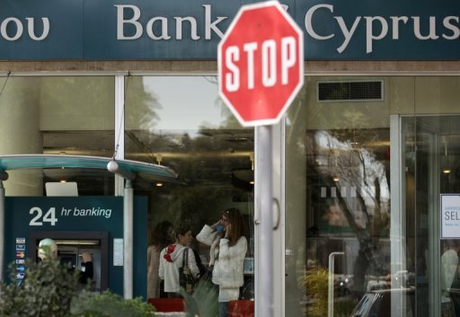Euro Ministers Bid to Finalise Cyprus Bailout

Eurozone and EU finance ministers meet from Friday in Dublin to put finishing touches on the Cyprus bailout, and also to consider extending debt repayment dates for Portugal and host Ireland, as well as tackling how to stamp out tax fraud.
The ministers from the currency area gather first on Friday morning, and later they are to be joined by non-euro, European Union peers. Europe's central bankers will enter the fray thereafter for talks wrapping up on Saturday.
The ministers' first job will be to finality the conditions Cyprus must meet in terms of cuts, fundraising and reforms in exchange for some 10 billion euros ($13 bn) of loans from eurozone partners and the International Monetary Fund.
A first payment is due early in May. Nicosia needs access to the cash soon, it says, with 75 million euros urgently required to meet public-sector pay requirements.
The Cyprus bailout deal served as something of a watershed, with ordinary bank depositors (as well as investors) at one point facing an involuntary wipeout of part of their holdings.
Once opposition gathered momentum, the plan changed to spare small savers but will see the island's No. 2 bank Laika dismantled and No. 1 Bank of Cyprus restructured radically.
Some investors may wait a long time to find out how much they have lost.
The peak volume of Cyprus's debts if the plan is enacted as foreseen remains unknown, but ministers will assess the latest debt-sustainability analysis produced by EU-IMF Troika officials.
"It'll be mainly focused on Cyprus," one well-placed official told Agence France Presse of the discussions to formally give a green light to parts of a scheme that would allow a pot of eurozone financial guarantees to recapitalize dodgy banks directly.
"A political agreement is possible," said another of the fine print on the bailout.
The Dublin meeting will also discuss a Troika report revealed late Wednesday, saying the bank restructuring will put Cyprus into deep recession for two years, with its gross domestic product expected to shrink by about 12.5 percent in 2013 and in 2014.
After months in which European Union leaders sought to play down debt-crisis risks, Cyprus reignited concerns despite its small size as it raised the prospect that savings could be at risk.
Meanwhile, worries that Slovenia may need a bailout refuse to go away, and the political deadlock in Italy has raised concern that the eurozone's third largest economy will be able stay on top of its massive debt.
In Portugal, the government is scrambling to find new spending cuts after the Constitutional Court rejected a number of austerity measures in order to continue to qualify for loans disbursements under its 78 billion euro bailout.
Alongside host Ireland, Lisbon is seeking a relaxation of the repayment terms of its rescue loans, which would ease its finances and return to the private bond markets.
A renewed drive to stamp out tax fraud, launched amid a tax-haven scandal currently embroiling French President Francois Hollande's government, is also likely to feature prominently.
Inspired by a 2010 U.S. law which moves toward automatic sharing of bank account information, on Tuesday Britain, France, Germany, Italy and Spain said they had agreed to work on setting up a multilateral information exchange facility they hope will serve as a template for a wider system.
The complete implementation of EU rules on automatic exchange of information on EU residents who have bank accounts in other countries has been held up by Austria and Luxembourg, although the latter has now signaled that it is prepared to comply.



